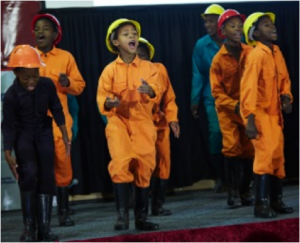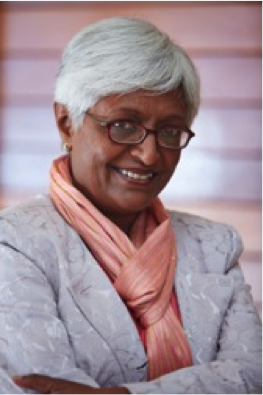Cape Town, June 27th, 2013 – Under a perfectly blue South African Sky, 240 participants gathered at the Muizenberg Pavilion to launch the first day of the AIMS Global Alumni Reunion (GAR). This group, comprising AIMS alumni, staff, partners, lecturers, leaders in development, government officials and renowned scientists, came together to celebrate 10-years of The African Institute for Mathematical Sciences (AIMS), and to reflect on how Maths and Science can transform the African Continent.
The morning session was full of stories of hope, change and perseverance that addressed how and why AIMS staff and alumni have arrived at this very intersection in their lives. Presentations brought to light the troubles that many Africans face on the road to success – from genocide in Rwanda, conflict in the DRC, to living as a “street child” in Benin. Despite their almost impossible beginnings, these individuals have moved beyond a World Bank statistic to re-emerge as true African success stories. But their stories do not just stop with their own accomplishment, and in some cases survival. Members of the AIMS family are dedicated to changing the lives of others by passing on knowledge and opportunities to their peers and to the next generation. A common word that came up again and again during the day was “critical mass.” This is the perfect term to describe the nature of the day. The term – derived from nuclear physics – is rooted in science, yet is now commonly used to address major social and intellectual movements. This is exactly what the GAR is about: the marriage of science and humanity.
The day began with a welcome from GAR organisers Mireille Massouka and Arun Sharma. In order to keep the spirit of joy alive in the mathematical sciences, they kicked off the event – literally – with a Gumboot Dance performance by Happy Feet. The dance, created by miners in South Africa as an alternative to drumming (which was restricted by authorities), perfectly demonstrated how innovation can triumph oppression.
Barry Green, Director of AIMS South Africa then welcomed the delegation stating that the best thing that AIMS can do is to build a “culture of the people to create a Pan-African movement.” Part of that Pan-African movement was codified through the brief welcome by AIMS alumni Klébert Kentia Tonleu (Camaroon) and Savannah Nuwagaba (Uganda). The two outlined their work and how AIMS has provided them the opportunity to thrive in the mathematical sciences. “If I am able to succeed, it is because of the background and experience I have received at AIMS,” noted Tonleu. Nuwagaba echoed this sentiment stating, “the knowledge that Africa needs begins at AIMS.” Nuwagaba, who works on mathematical modeling of ecological systems, ruminated on the title of the Global Alumni Reunion, “Transforming Africa Through Knowledge-Based Enterprise.” She deduced that “knowledge-based enterprise” is really “using knowledge to create opportunities to develop new knowledge.” She urged the participants to use the GAR as a springboard to find real solutions for Africa’s problems. Similarly, Tonleu stated, “We have to think of the best and most strategic strategy, and I hope by the end of this reunion we find one.”
Neil Turok, Founder of AIMS, took the podium and illustrated the possibilities for the alumni in the room by showing a photo of a young Albert Einstein. He said of Einstein: “he looked a lot like you. He came from a disadvantaged background. Jews could not access university until the early 19th century, so when they had access, they had something to prove. To prove that Jews are not inferior beings. When this wave of Jews entered academia, they transformed Science! I think physics is again to be transformed, and I hope Africa will be that contributor.”
Turok then shared his experience of teaching in a Lesotho village, which spurred his passion for mathematical science education in Africa. He saw that there was talent in abundance in the villages of Africa. “There are kids who are talented and clever to build this continent but they don’t have the chance or the opportunity and all of that talent is wasted. And that stuck with me, and lead me to open AIMS.” With similar motivations to encourage African youth, Executive Director of AIMS Next Einstein Initiative (AIMS-NEI), Thierry Zomahoun, shared his moving story of living as a street child in Cotonou, Benin. He summed it up in three words: desperation, hope, and opportunity. His salvation was education and now he is passionate about the work of AIMS and AIMS-NEI in providing education to others. “I started out life as a statistic,” he said. “My life growing up in the street was cocktail of fear, sorrow, cries, hunger, thirst. I had zero opportunities. The chain linking me to that statistic was broken when I entered school. If you embrace education, education will set you free.”
The keynote address was given by Ben Turok, former anti-apartheid activist and current Chairman of the Ethics Committee in South African Parliament. He noted that AIMS is creating a critical mass to transform Africa. He stressed the need for increased African technology: “what we use in Africa is not made in Africa. We need to change that. We need to break the dominance of Western imports and start producing.” And beyond the management of industry, Turok feels there is need for African innovation across the board, including in data, statistics, minerals, and natural resources.
A series of five Interviews were then conducted with Alumni: Charles Mberi Kimpolo (Congo), Grace Omollo Misereh (Kenya), Jeanne Marie Onana (Camaroon), Clarisse Uwizeye (Rwanda) and Trust Chibawara (Zimbabwe). Through their stories, it became clear that many alumni were referred to AIMS by a friend, demonstrating the power of youth and networks – a critical mass of the “new” African citizens. The Alumni shared some heart-wrenching stories, such as Charles Mberi Kimpolo of Congo, who fled to the forest for three years during a coup d’état, and Clarisse Uwizeye, a survivor of the Rwandan genocide. Despite these obstacles, they are passionate about their own work and the work of AIMS. “AIMS is a bridge between our specific family stories and where we want to go,” said Kimpolo. Clarisse, a musician as well as scientist, played a self-written song about AIMS for the group.
After a very emotional morning, the participants took a deep breath, and the event shifted focus to address big issues in African Development. Two interactive sessions took place simultaneously: The role of Research in African Development, moderated by Barry Green, with panelists: Maja Clausen, Naser Faruqui, Jonathan Farley and Juma Shabani and Visioning the Africa of Tomorrow, moderated by Fidèle Sonon, with panelists: DK Osseo-Asare, Fritz Hahne and Gita Goven.
In Visioning the Africa of Tomorrow the panelists addressed visions of Africa’s sustainable futures, through the creation of new cities that utilize regenerative ecology and the development of green energy solutions. Fritz Hahne, Founding Director of AIMS-South Africa, posed the question of whether Africa should take the fossil fuel path of the developed world, or leapfrog into renewable energies, and made a strong case for the latter. Gita Goven, one of South Africa’s foremost sustainability thinkers, argued for the creation of a sustainable community, and explained the work of Community Grill and their flagship project, Wescape (outside of Cape Town), which will create homes for 200,000 households. DK Osseo-Asare, an architect and designer, spoke of solutions to Africa’s increasing urbanization, and how conventional city planning methods are neither effective nor relevant to local communities, forcing 72% of urban Africans to live in extremely poor conditions.
The Role of Research in Africa’s Development looked at how Africa’s development challenges (from poverty to poor nutrition to health) can be addressed by investing in research and science. Some findings from the session were: there is a need for genuine collaboration between governments and external supporters for greater impact and sustainability; capacity building in Africa and involvement of the private sector are key; and there are many research funding opportunities that AIMS can explore.
The two breakout sessions reconvened for a special announcement from Thierry Zomahoun supported by the AIMS team. He informed the participants of an official “Call For Action” that has gone public which demands that officials push for tertiary education, mathematical science education and innovation across the continent. Further, Thierry announced the creation of The Next Einstein Forum – a global, high-level forum on science and innovation for development – with an anticipated launch in Addis Ababa in 2015.
Ulrike Albrecht, Head of the Humboldt Foundation’s Department of Strategy and External Relations, then announced that Robert Bosch Stiftung is committed to supporting AIMS. In addition to currently funding an endowed chair at AIMS Senegal, they would like to support four further chairs in Ghana, Tanzania, Nigeria and South Africa, resources pending.
Two more interactive sessions then took place simultaneously. Other Innovative models of Education featured new innovative approaches to education and research as well as best practices from around the world, moderated by Adele Newton, with panelists: Bruce Bassett, Bob Crow, Nkem Khumbah and François Tsobnang. AIMS Alumni Research Highlights showcased the groundbreaking research being carried out by AIMS own graduates.
Other Innovative Approaches to Education assessed how science and mathematics can be made more exciting – and yet practical – at a low cost through the use of technology. The session explored how African science education institutes can take advantage of the Internet and computing technologies to make learning come alive through the use of computer games.
AIMS Alumni Research Highlights looked at the research of five AIMS Alumni, and was moderated by Brenda Penante. Alumni research areas are inspiring and diverse, for example, Eleni Kinfe Degaga has been looking at how cells respond to mechanical forces or external perturbations, where Prosper Ngabonziza researches nanotechnology. Bewketu Teshale Bekele, Timothy Kuria and Akinlotan Morenikeji Deborah all look at disease management and prevention, such as in cancer, HIV and Malaria.
By the end of the first day, the 240 people in the room, from 44 countries, countless cultures, and varied life experiences, left feeling they had shared in a very special experience together. With the momentum from day one mounting, the Global Alumni Reunion is certain to be a catalyst for change in the Africa of tomorrow.




